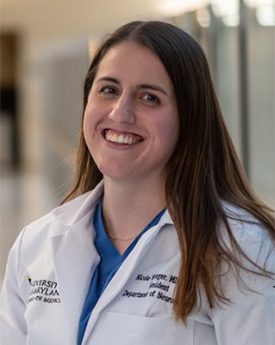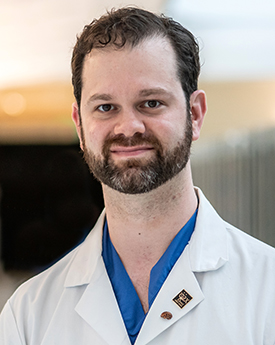Testimonials | Neurosurgery Residency

Nicole Wenger, MD, MBA
Resident, PGY-5 | Class of 2027
What drew you to the field of neurosurgery?
I've been interested in the brain and neuroscience since I was in middle school. In medical school, I discovered I loved working with my hands in the OR and couldn't imagine myself doing anything else.
Do you have a specialty area you plan to pursue?
I'm most interested in cerebrovascular and endovascular neurosurgery right now, although I have interest in many of the specialties.
What are your research or professional interests?
I got an MBA in medical school and I'm very interested in quality and process improvement as well as how we systematically deliver healthcare. I'm also interested in aneurysms, from how they form to how we treat them.
What brought you to the University of Maryland?
When I interviewed and went to the pre-interview dinner, I immediately sensed the camaraderie that the residents had and felt that was critical when searching for a program. The University of Maryland is a strong training program and I knew that in seven years I would leave confident in my training to be a neurosurgeon. Specifically as someone interested in vascular neurosurgery, I knew that the vascular training here would be excellent.
What are you most looking forward to during your residency training?
Although overwhelming, I am looking forward to learning everything there is to learn about neurosurgery and being able to look back each year and see how far I've come in my training. I'm also looking forward to exploring Baltimore! There are lots of outdoor activities in the area, from great hiking to kayaking, which I am excited to do. I grew up on a pig farm in the plains of the Midwest, so my surroundings are a bit different now!
Is there any advice you would give to medical students interested in neurosurgery?
Don't be afraid to get involved in your neurosurgery department early, from learning how to conduct research projects to asking questions about what being a neurosurgeon is really like. On the interview trail, ask lots of questions to the residents and get their contact info; don't be afraid to ask them questions after the interview as they pop up. Residency is seven years of your life and it's a big decision! Lastly, neurosurgery is an incredible field and while it's hard work, let yourself enjoy it along the way.

Harry Mushlin, MD
Residency Alum | Class of 2020
Where do you find yourself now after graduating from residency?
I completed a Fellowship in Complex Spine and Neurotrauma at the University of Pittsburgh. Now, I have taken a position as Assistant Professor of Neurosurgery and Director of Complex Spine and Deformity at the Renaissance School of Medicine at Stony Brook University.
How did residency at Maryland prepare you for your fellowship and future career in neurosurgery?
University of Maryland offers amazing training. In particular, the spine and trauma training are second to none. Not only was I was extremely well-trained in general neurosurgery, I also got world class expertise in spine surgery and neurotrauma working across UMMC and Shock Trauma.
What did you value the most from your residency training?
I valued the consistency of the training, the mentorship, and the bond among the residents.
What advice do you have for individuals preparing for residency?
Find a place that fits your needs and that will help you throughout your career. The University of Maryland did all those things for me and was an exceptionally wonderful place to train. I would do it again.


